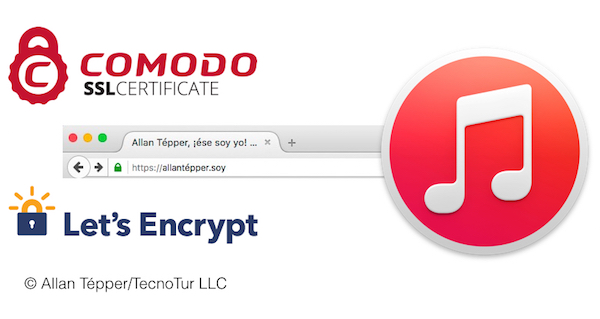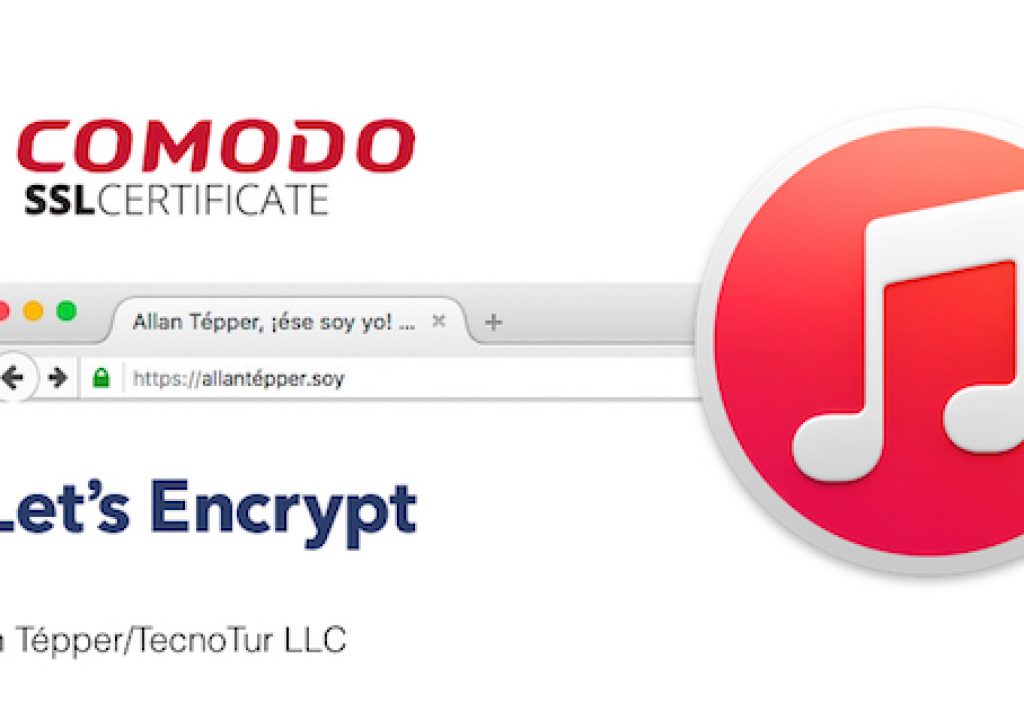
Shortly after Google’s decree of 2014, where the search giant declared that search results would now favor encrypted sites with SSL via an HTTPS with a padlock… and even display warnings in the Chrome browser for non-compliant sites, I added that feature to all of my websites and those of most of my clients. Before then, the consensus was that we only needed SSL/HTTPS for websites that accepted credit cards or other confidential information. Then came Let’s Encrypt to make the SSL certificate free. Fortunately, those free certificates satisfy Chrome, Firefox, Opera and Safari, but unfortunately they don’t yet satisfy iTunes. If you have any website at all, this is important to you. If you distribute content as an audio or video podcast via iTunes, you’ll pay even more attention. Details are ahead in this article.
Benefits of SSL via HTTPS in general
Here is a very short summary about the benefits of SSL via HTTPS. When you visit a website with a grey padlock in Safari or a green padlock in Chrome, Firefox or Opera, you get the following benefits:
- You will be sure that you reached the exact website you wanted to visit, not a cloned site often used in phishing attempts.
- Your ISP cannot inject X-UIDH into the traffic to track you for its advertisers.
- Your credit cards, passwords and other confidential information you may enter will be unreadable to middle-in-the-man hackers who try to “sniff” the information.
New SEO advantages of SSL
(SEO = search engine optimization.)
Ever since its decree of 2014, Google —the search engine giant— favors websites with SSL via HTTPS in its search results. This is a euphemism for punishing websites that don’t have it. This is critical if you expect to be found by people who search for sites which cover keywords they enter. It’s one of three key Google decrees I always take into account in configuring my sites and those of my clients.
I feel bad for services like SquareSpace, since they were obviously designed before Google’s decree, and it would likely be quite troublesome to reengineer to allow for HTTPS for their clients’ websites. Currently, they only allow HTTPS using a subdomain of their own domain, since they designed it back when it was only critical when entering in credit cards.
The agony followed by the reward of the green padlock
After you install an SSL certificate (and before you change your site to make it re-direct non-HTTPS traffic to HTTPS), you’ll want to test it. For brand new sites, it’s fairly easy. However, when you are adding it to an older site, you’ll often find details that need to be fixed before Safari will grant its grey padlock, or when Chrome, Firefox or Opera will grant its green one. The older the website, the more things that are likely to be needed to be fixed. When you finally get the reward of seeing the green padlock in all browsers that can show one, you’ll celebrate by switching your site to re-direct all non-HTTPS traffic to HTTPS and therefore give your visitors an extra feeling of confidence.
After successful implementation, the Chrome and FireFox browsers display the green padlock followed by the (otherwise unnecessary to show) https:// prefix.
After successful implementation, the Opera browser displays the green padlock and truncates the https// prefix, which is visually cleaner while still fulfilling the goal. The new Edge browser from Microsoft does the same.
Pay for your SSL, or get it free thanks to Let’s Encrypt
At first, most of us had to pay to get an SSL certificate. The price varies depending upon several details.
The price I paid for a Comodo commercial certificate via my chosen hosting provider has been US$15 per year domain, and it fortunately satisfies Chrome’s demanding requirements to get a green padlock (as long as everything on the page is configured properly).
Then came Let’s Encrypt, a free, automated, and open certificate authority, run for the public’s benefit. Let’s Encrypt is a service provided by the Internet Security Research Group, and its certificate also fortunately satisfies Chrome’s demanding requirements to get a green padlock (as long as everything on the page is configured properly). Then my chosen hosting provider fortunately decided to facilitate auto-installation and auto-renewals of the free certificates from Let’s Encrypt, and I began replacing the Comodo ones as they were about to expire.
iTunes’ incompatibility with Let’s Encrypt
First, I want to thank Ray Ortega of The Podcasters’ Studio and Daniel J. Lewis of The Audacity to Podcast. That’s because I first discovered from them via Podcasters’ Roundtable about Apple’s new Podcasts Connect, the new podcast dashboard for iTunes. I am thanking them, because when I signed into this new portal for the first time, I saw that iTunes was objecting to the Let’s Encrypt SSL certificate for my CapicúaFM show (even though I had received a green light from Chrome, Firefox and Opera. I then confirmed about iTunes objection by searching and finding Dominic Rodger’s post. I immediately ran to renew the Comodo certificate for another US$15 per year for that particular site, and iTunes was happy again with CapicúaFM after a couple of hours.
What about IDN (International Domain Names) with diacritical marks?
Domain names like AllanTépper.soy and others that use accent marks and other diacritical marks don’t yet work with Let’s Encrypt, so for those I still have to pay the US$15 per year for those certificates.
Conclusions and the moral of the story
Use HTTPS whenever you can.
Add an SSL certificate to all of your websites. The free Let’s Encrypt SSL certificate is fine for any site that is not creating an RSS feed for iTunes, as long as your host supports it. Otherwise, you can consider using my chosen hosting service, which not only facilitates the auto-installation and auto-renewal of Let’s Encrypt and Comodo certificates, but also supports byte range requests, another iTunes requirement for media files. Any website that creates an RSS feed for iTunes should use an SSL certificate from some other certificate authority like Comodo or another one listed in Apple’s response on Dominic Rodger’s post. After you get a green padlock, redirect all non-HTTPS traffic to HTTPS.
Recent related articles
- The making of a cross-platform audio/video multimedia ebook
- All audio production & distribution should go 48 kHz. Learn why.
- Use the under US$50 Kindle Fire as a 48 kHz audio recorder
Upcoming articles, reviews, and books
Stand by for upcoming articles, reviews, and books. Sign up to my free mailing list by clicking here.
Si deseas suscribirte a mi lista en castellano, visita aquí. Si prefieres, puedes suscribirte a ambas listas (castellano e inglés).
Books, consulting, articles, seminars & radio programs
Contact Allan Tépper for consulting, or find a full listing of his books, articles and upcoming seminars and webinars at AllanTepper.com. Listen to his CapicúaFM show at CapicúaFM.com in iTunes or Stitcher.
My latest book (paperback + ebook)
My most recent book is available in two languages, and in paperback as well as an ebook. The ebook format is Kindle, but even if you don’t have a Kindle device, you can read Kindle books on many other devices using a free Kindle app. That includes iPad, Android tablets, Mac computers, and Windows computers. Although generally speaking, Kindle books are readable on smartphones like Androids and iPhones, I don’t recommend it for this particular book since it contains both color photos and color comparison charts. The ebook is also DRM-free.
In English, it’s The Castilian Conspiracy. Click here and you will be automatically sent to the closest Amazon book page to you based upon your IP address. Or request ISBN–10: 1456310232 or ISBN–13: 978–1456310233 in your favorite local bookstore.
En castellano, se llama La conspiración del castellano. Haz clic aquí para llegar al instante a la página del libro correspondiente a tu zona y moneda en Amazon, según tu dirección IP. De lo contrario, solicítalo en tu librería preferida con los ISBN–10: 1492783390 ó el ISBN–13: 978–1492783398.
FTC disclosure
No manufacturer is specifically paying Allan Tépper or TecnoTur LLC to write this article or the mentioned books. Some of the other manufacturers listed above have contracted Tépper and/or TecnoTur LLC to carry out consulting and/or translations/localizations/transcreations. Many of the manufacturers listed above have sent Allan Tépper review units. So far, none of the manufacturers listed above is/are sponsors of the TecnoTur programs, although they are welcome to do so, and some are, may be (or may have been) sponsors of ProVideo Coalition magazine. Some links to third parties listed in this article and/or on this web page may indirectly benefit TecnoTur LLC via affiliate programs.
Copyright and use of this article
The articles contained in the TecnoTur channel in ProVideo Coalition magazine are copyright Allan Tépper/TecnoTur LLC, except where otherwise attributed. Unauthorized use is prohibited without prior approval, except for short quotes which link back to this page, which are encouraged!

